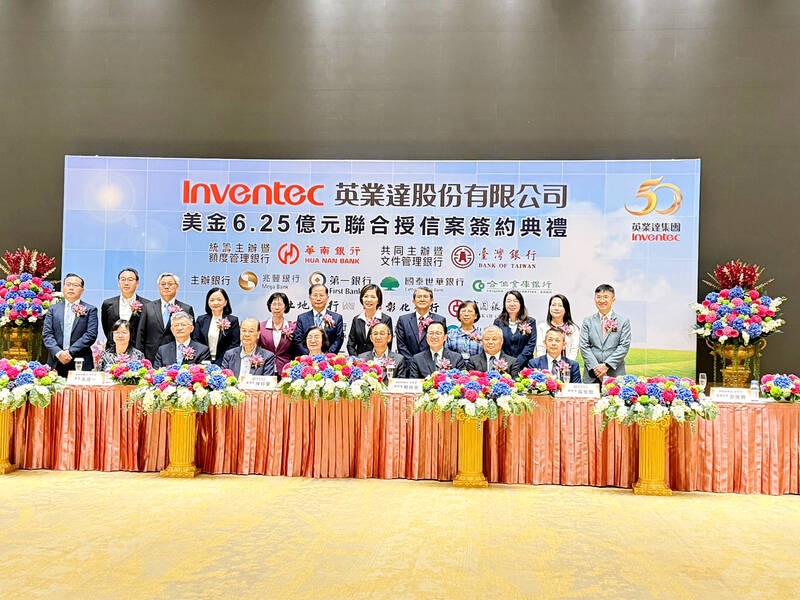Inventec Corp (英業達) yesterday signed a US$625 million syndicated loan with a group of banks led by state-run Hua Nan Commercial Bank (華南銀行) to bolster its development of artificial intelligence (AI) servers and other key products.
The syndicated loan was 150 percent oversubscribed as Inventec, which produces notebook computers, servers, data-center systems, automotive electronics and smart devices, had intended to borrow US$500 million, a news release showed.
The deal comes as Inventec scales up its manufacturing capacity as demand for AI servers, automotive electronics and telecommunications devices continues to grow.

Photo courtesy of Inventec Corp
The company is also diversifying its overseas production to Mexico, Malaysia, Vietnam, Thailand and the US.
Inventec has manufacturing bases for automotive electronics in Vietnam and Mexico, production facilities for wearable devices in Malaysia and Vietnam, notebook computer assembly lines in Thailand and Vietnam, and server plants in Taiwan, Mexico and Thailand.
Last week, the company completed a joint venture deal with Dixon Technologies (India) Ltd to manufacture notebook computers, servers and desktop PCs in India. Under the deal, Inventec holds a 40 percent stake, while Dixon owns the remaining 60 percent.
Inventec earlier this month reported cumulative sales of NT$519.9 billion (US$16.96 billion) for the first nine months of the year, up 15.92 percent year-on-year, on the back of robust shipments of servers and notebook computers.
The company said it expected the syndicated loan to provide the capital it needs to expand its global operations, enhance its international competitiveness and drive long-term, stable growth.
Hua Nan Bank is the lead arranger of the syndicated loan, and was joined by other lenders, including Bank of Taiwan (臺灣銀行), Mega International Commercial Bank (兆豐銀行), First Commercial Bank (第一銀行), Cathay United Bank (國泰世華銀行), Land Bank of Taiwan (土地銀行), Taiwan Cooperative Bank (合作金庫), Chang Hwa Commercial Bank (彰化銀行), E.Sun Commercial Bank (玉山銀行), Taishin International Bank Co (台新銀行), Bank of China (中國銀行) and China Construction Bank (中國建設銀行).

KEEPING UP: The acquisition of a cleanroom in Taiwan would enable Micron to increase production in a market where demand continues to outpace supply, a Micron official said Micron Technology Inc has signed a letter of intent to buy a fabrication site in Taiwan from Powerchip Semiconductor Manufacturing Corp (力積電) for US$1.8 billion to expand its production of memory chips. Micron would take control of the P5 site in Miaoli County’s Tongluo Township (銅鑼) and plans to ramp up DRAM production in phases after the transaction closes in the second quarter, the company said in a statement on Saturday. The acquisition includes an existing 12 inch fab cleanroom of 27,871m2 and would further position Micron to address growing global demand for memory solutions, the company said. Micron expects the transaction to

Nvidia Corp’s GB300 platform is expected to account for 70 to 80 percent of global artificial intelligence (AI) server rack shipments this year, while adoption of its next-generation Vera Rubin 200 platform is to gradually gain momentum after the third quarter of the year, TrendForce Corp (集邦科技) said. Servers based on Nvidia’s GB300 chips entered mass production last quarter and they are expected to become the mainstay models for Taiwanese server manufacturers this year, Trendforce analyst Frank Kung (龔明德) said in an interview. This year is expected to be a breakout year for AI servers based on a variety of chips, as

Global semiconductor stocks advanced yesterday, as comments by Nvidia Corp chief executive officer Jensen Huang (黃仁勳) at Davos, Switzerland, helped reinforce investor enthusiasm for artificial intelligence (AI). Samsung Electronics Co gained as much as 5 percent to an all-time high, helping drive South Korea’s benchmark KOSPI above 5,000 for the first time. That came after the Philadelphia Semiconductor Index rose more than 3 percent to a fresh record on Wednesday, with a boost from Nvidia. The gains came amid broad risk-on trade after US President Donald Trump withdrew his threat of tariffs on some European nations over backing for Greenland. Huang further

HSBC Bank Taiwan Ltd (匯豐台灣商銀) and the Taiwan High Prosecutors Office recently signed a memorandum of understanding (MOU) to enhance cooperation on the suspicious transaction analysis mechanism. This landmark agreement makes HSBC the first foreign bank in Taiwan to establish such a partnership with the High Prosecutors Office, underscoring its commitment to active anti-fraud initiatives, financial inclusion, and the “Treating Customers Fairly” principle. Through this deep public-private collaboration, both parties aim to co-create a secure financial ecosystem via early warning detection and precise fraud prevention technologies. At the signing ceremony, HSBC Taiwan CEO and head of banking Adam Chen (陳志堅)